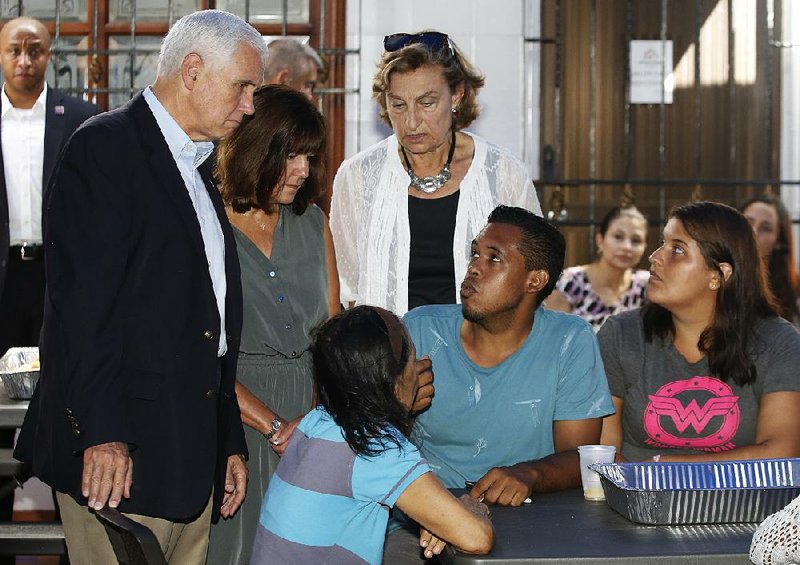CARTAGENA, Colombia -- Seeking to highlight the growing plight in Venezuela, Vice President Mike Pence on Monday met with people who have fled the country to neighboring Colombia.
Pence visited the Calvary Chapel in Cartagena, where he met with faith leaders and Venezuelan families before a planned departure to Buenos Aires, Argentina. His wife, Karen Pence, helped to lead a prayer circle, where she prayed for "comfort to the Venezuelan refugees."
The vice president and his wife also spent time speaking with the migrants, listening to their emotional stories. Reporters were not able to hear their conversations, but they watched the vice president comfort several women, including at least one who was seen wiping away tears.
He said he heard "heartbreaking" stories of their struggle for food.
"President [Donald] Trump's made it very clear we will not stand by while Venezuela collapses into dictatorship," Pence said, arguing that "a failed state in Venezuela threatens the security and prosperity of our entire hemispheres and the people of the United States."
Asked whether the U.S. would commit additional financial aid for those migrating from Venezuela, Pence said only that the U.S. "has a long and storied history of generosity with regard to refugees populations, and it's happening here in Colombia."
The Trump administration has pushed to reduce the number of refugees allowed into the U.S. as well as money spent on foreign aid.
Venezuelan officials have been firing back in a series of statements, with Information Minister Ernest Villegas on Monday denouncing U.S. meddling in Venezuela's affairs as hypocritical.
"The US and its satellite in Bogota are trying to give classes in democracy to Venezuela while it provides cover for neo-Nazis in its own territory," Villegas said on Twitter, linking to photos of the recent deadly march in Charlottesville, Va., involving far-right groups.
Venezuelan President Nicolas Maduro asked the pro-government constitutional assembly on Monday to investigate the opposition for allegedly supporting Trump's threat of a "military option" to resolve the country's political crisis.
Addressing a pro-government rally, Maduro said Trump's remarks were prompted by the failure of the opposition's campaign to oust him after months of destabilizing protests that left more than 120 people dead and hundreds injured.
Maduro said the truth commission created by the constitutional assembly should investigate opposition leaders as "traitors" for not speaking out clearly against the U.S. president.
The main opposition alliance rejected the use of military threats to resolve Venezuela's crisis. But its Sunday statement didn't mention Trump by name and instead accused Maduro of ceding Venezuelan sovereignty and oil wealth to Cuba and other powers.
In the Colombian border city of Cucuta, an estimated 25,000 Venezuelans make the trek across the Simon Bolivar International Bridge into Colombia each day. Many cross for a few hours to work or trade goods on the black market, looking for household supplies they cannot find back home.
But increasingly, they are arriving to eat in one of a half-dozen facilities offering struggling Venezuelans a free plate of food.
"I never thought I'd say this," said Erick Oropeza, 29, a former worker with Venezuela's Ministry of Education who recently began crossing the bridge each day. "But I'm more grateful for what Colombia has offered me in this short time than what I ever received from Venezuela my entire life."
As Venezuela's economy verges on collapse and its political upheaval worsens, cities like Cucuta along Colombia's porous, 1,370-mile border with Venezuela have become firsthand witnesses to the neighboring South American nation's escalating humanitarian crisis.
According to one recent survey, about 75 percent of Venezuelans lost an average of 19 pounds last year.
The Colombian government has crafted contingency plans in the event of a sudden, mass exodus, but already church groups and nonprofit organizations are stepping in, moved by images of mothers carrying starving babies and skinny men trying to make a few bucks on Cucuta's streets to take back home.
Oropeza said he earned about $70 a month working at the Ministry of Education and selling hamburgers on the side -- twice Venezuela's minimum wage but still not enough to feed a family of four. Once a month, his family receives a bundle of food provided by the government, but it only lasts a week.
"So the other three weeks, like most Venezuelans, we have to make magic happen," he said on a recent afternoon.
Desperate for money to feed his family, he left his job and traveled to the Venezuelan border town of San Antonio. He wakes up at 4 a.m. each morning to be among the first crossing the bridge into Cucuta, where he earns money selling soft drinks on the street.
Pence is trying to rally the region against Maduro's attempts to consolidate power. Pence on Sunday denounced Maduro's tactics and said the U.S. will not stand by as Venezuela "crumbles."
Information for this article was contributed by Luz Dary Depablos, Christine Armario and staff members of The Associated Press.
A Section on 08/15/2017
